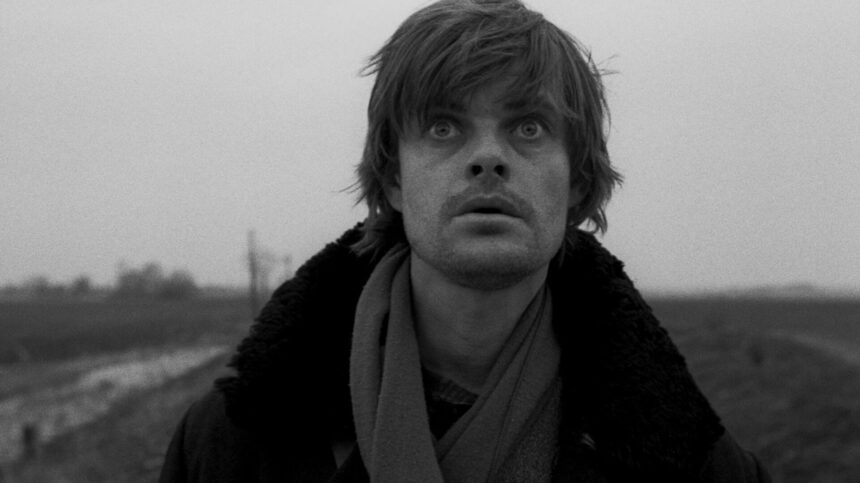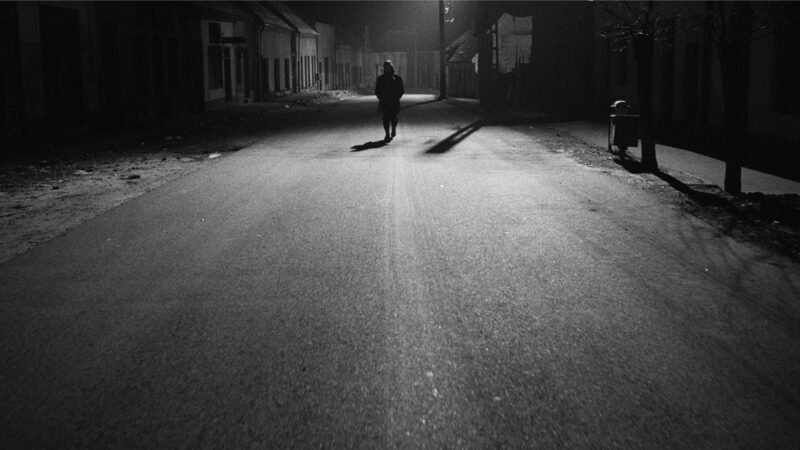WERCKMEISTER HARMONIES Blu-ray Review: The Profound and Desperate Hours

Given the uniqueness and weirdness of the films of Bela Tarr, it's surprising that more of his films are not part of the Criterion collection. Here's hoping that his masterpiece Werckmeister Harmonies is but the first. A stark and deeply humanist portrayal of a small town sinking under the weight of its own desperation, it's a singular vision of a dystopian state that has already arrived, even if it's hidden in small parts of the world, and well worthy of a 4K/Blu-ray release.
It's what must be a typical evening at the local bar in this (presumably) average town in Hungary, and the barman is calling the rather early closing time of 10pm. But before everyone leaves, they insist that János (Lars Rudolph), of the few in the town, it seems, with the desire to learn, tells the tale of the solar system, much to the enjoyment of the workers. He then sets out into the night to what are likely his usual tasks: helping his friend, the local intellect and musicologist, to get to bed; going to collect newspapers at the local post office to delivery; finally getting to bed as the sun rises. But this day dawns differently: some carnival is coming to town, apparently with biggest whale in the world.
What is advertised as a grand extravaganza, however, just seems to be one very house on a truck, in which most of the space is taken up by a stuffed whale. Despite the crowds of men (and it is just men) hovering around trash can fires in the rundown town square, János is the only one who gets a ticket to see this wonder of nature. But somehow, this slight disruption to what seems like a vacant routine incites anger and hatred in the town, sets off a series of events that leave János isolated from his fellow citizens.
To say that this town has seen better days would be an understatement. In fact, it feels as if, with the exception of the town square and one violent event, no one ever leaves their homes (or the bar) except for János. Is he a ghost, or is he the last living inhabitant? The year is never indicated specifically, and it could be anywhere from around 1970 onward; we only know the country because of the language. Maybe the rest of the world gas tipped over into apocalypse, and somehow it hasn't quite reached the town; or maybe this is their own quiet apocalypse, which vacates all but the town square. The use of black and white gives such as sense of the bleak and the empty; only János brings a quiet beating heart to this, the only place he knows.
This is a place haunted: by the spector of communism and the Iron Curtain; by the coming of an eclipse; by the wasteland that seems to be creeping in on them. No wonder the arrival of something unknown would be regarded by most as suspicious. But no one knows what it is. Only János even bothers to see the whale, and The Prince, the mysterious figure that everyone seems to think has arrived with underhanded and powerful intentions, is only seen in shadow. Does he even exist? Upon what rumours and presumptions will János' fellow citizens wreak their havoc?
It feels as if nothing happens, then suddenly everything does, and it speaks to Tarr's disinctive expressions of time and space. With a running time just short of 2 1/2 hours, there are less than 40 shots - some take a mere minute, some several, but in each, Tarr both invades and respects his characters' space. The choereography and blocking of these shots is extraordinary to comprehend - of course the larger group scenes, as a large group of townspeople inexplicably attack a hospital and its patients - but even the smaller scenes of János walking down the road. There is all this space and time Tarr is filling with a profound sense of loneliness or urgency or despair.
At first, this technique of the long takes might feel like theatre - and there is an element of this. But it's also about understanding how these moments move, how tension is built, how the camera winds between the people, between the buildings, skimming above the surface of the ground like the wind. The wind of change, the wind angry and cold, the wind as the only thing that can move freely, as the army and their barbed wire fences move in to contain a riot against - it's never clear. Not even the whale is immune to the people's anger.
Werckmeister Harmonies is a somewhere between feverdream and cautionary fable. Like the town it portrays, it exists on a precarious edge, strangely balanaced yet constantly under thread from the inside. It weaves its magic like something ancient and immortal, a constant simmering sorrow that still reaches for the light.
Given how recent the film is, the transfer from 35mm original camera negative means that the disk looks gorgeous. Supervised and approved by Tarr, it captures the nuance that is often missing in black and white film transfers. Tarr's films rely on that nuance, oddly more stark in black and white, needing to be sought out in his signature long takes, and even as you are watching this on your home screen, this transfer allows for that seeking to be fruitful.
It's always a treat when the standard booklet is a poster, as is the case here. On one side, a still from the film of that penetrating eye of the abandoned whale. On the other side, an excellent essay by Dennis Lim. Indeed, having the essay in this format, to be seen in its entirety at once on this large page, is reminiscent of a Tarr long take - a reader can see the whole as they read. Lim's considered interpretation of the film is coupled with a look at its place in Tarr's œuvre and its place in Hungarian film history and contemporary political strife.
An interview with Tarr, while short, provides insight into his beginnings, his humility around his work with constant praise of his collaborators, his philosophy of developing a personal language over several films, and how his considered choreography comes from his love of and vision of the human face as a landscape to be explored.
The highlight of the special features is Family Nest, Tarr's feature debut, made when he was just 24. It's an homage to Italian neo-realism, an honest and, frankly, heartbreaking portrait of family life in Hungary in the early 1970s. A young couple is forced to live with the husband's parents while they wait for their own apartment to be assigned. The wife is increasingly subjected to anger and humilation from her father in law while she tries to protect her child. Meanwhile the father-in-law and her husband conduct affairs like it was nothing. There are some moments of joy, such as a trip to a fair with parengs and child. While the subject matter might seem atypical of Tarr, his style is beginning to show itself in long takes. One in which a young woman is being forced into sex, Tarr keeps the camera on her for several minutes, forcing the audience to know her and witness how she is being treated. Another keeps the camera long on the wife while her voice over narration provides insight into her thoughts and emotions. It's not an easy film to watch.








